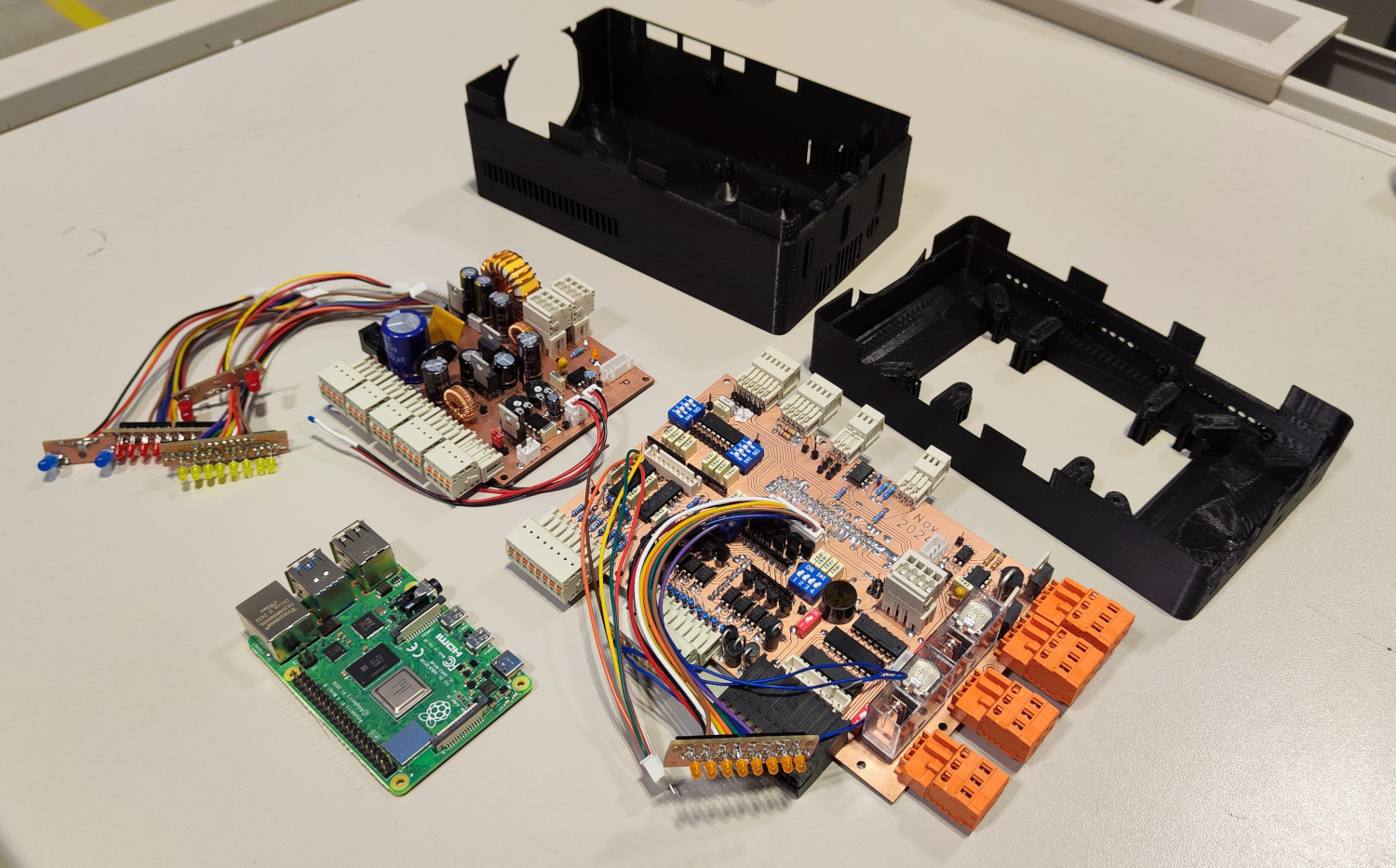

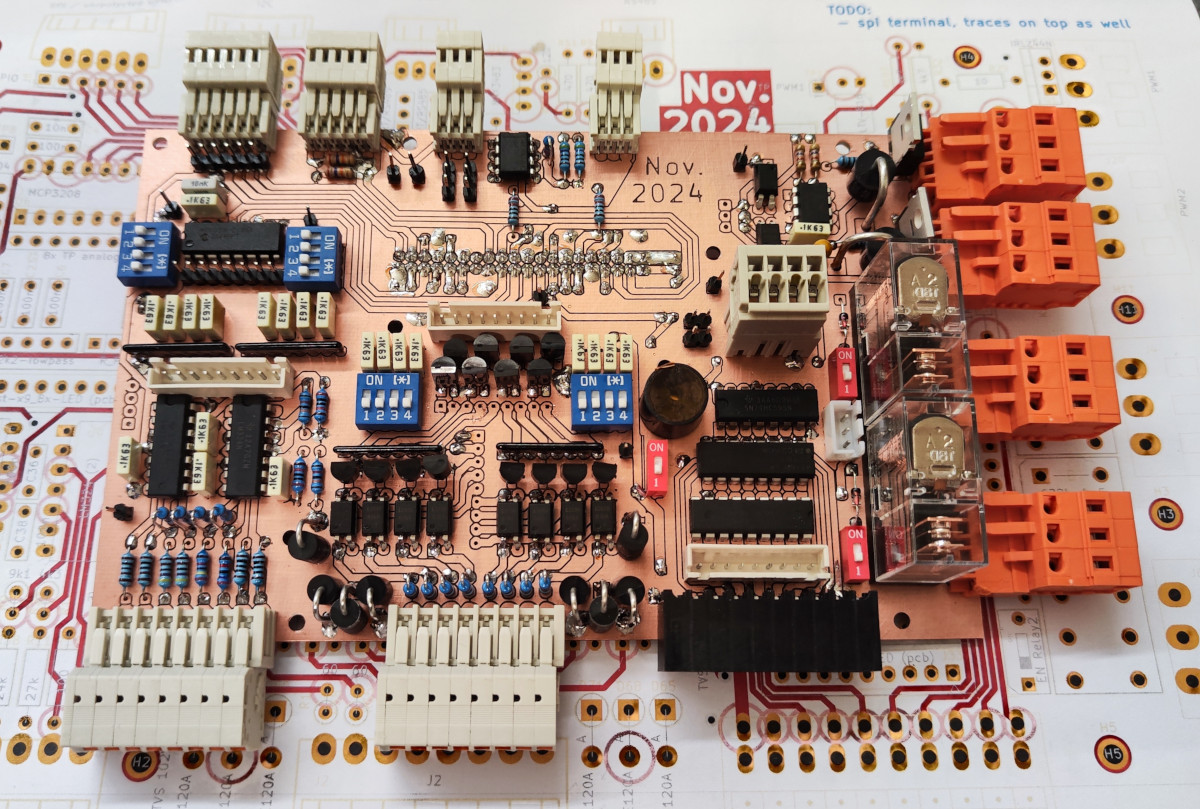 ### Features
**Inputs**:
- **8x Digital Inputs**:
- Wide continuous voltage range (-1.7 V to 120 V), idea: compatible with 3 V and 24 V devices.
- TVS diodes for ESD and spike protection.
- Reverse polarity protection.
- Isolated with optocouplers.
- Optional low-pass filters (toggle via DIP switches).
- **8x Analog Inputs**:
- Different fixed range inputs:
- 2x 0 - 3.3 V.
- 2x 0 - 5 V.
- 1x 0 - 12 V.
- 1x 0 - 24 V.
- 2x 0 - 20 mA.
- Overvoltage protection with clamping diodes.
- Optional low-pass filters (toggle via DIP switches).
**Outputs**:
- 1x onboard buzzer.
- 2x 16 A relays.
- 2x high-power MOSFETs (N-channel, max 55 V, 33 A continuous, 160 A pulsed).
- 8x digital outputs (via shift register):
- Low-power (30 mA push-pull) and high-power (500 mA open-drain) outputs.
- Buzzer and relays connected to channels 6-8, with enable/disable switches.
- Note: Outputs are **not short-circuit proof**.
**General**:
- WAGO spring-loaded terminals for easy wiring.
- JST connectors for external LEDs for all inputs and outputs to indicate the current pin state.
**Bus Communication**:
- RS485 (TVS protection, idle pull-up/pull-down, 120 Ω terminator).
- UART (unprotected).
- I2C (TVS diodes, 2.2 kΩ pull-ups).
- SPI (unprotected).
Note: Either RS485 or UART can be used at the same time (select with jumpers).
### Schematic and Layout
---
## 2. **Power Supply Board**
Creates different voltages from supplied 24 V. Supply for the Raspberry Pi interface board as well as several terminals for variable use (connect sensors, devices, etc., to the housing).
### Photo
### Features
**Inputs**:
- **8x Digital Inputs**:
- Wide continuous voltage range (-1.7 V to 120 V), idea: compatible with 3 V and 24 V devices.
- TVS diodes for ESD and spike protection.
- Reverse polarity protection.
- Isolated with optocouplers.
- Optional low-pass filters (toggle via DIP switches).
- **8x Analog Inputs**:
- Different fixed range inputs:
- 2x 0 - 3.3 V.
- 2x 0 - 5 V.
- 1x 0 - 12 V.
- 1x 0 - 24 V.
- 2x 0 - 20 mA.
- Overvoltage protection with clamping diodes.
- Optional low-pass filters (toggle via DIP switches).
**Outputs**:
- 1x onboard buzzer.
- 2x 16 A relays.
- 2x high-power MOSFETs (N-channel, max 55 V, 33 A continuous, 160 A pulsed).
- 8x digital outputs (via shift register):
- Low-power (30 mA push-pull) and high-power (500 mA open-drain) outputs.
- Buzzer and relays connected to channels 6-8, with enable/disable switches.
- Note: Outputs are **not short-circuit proof**.
**General**:
- WAGO spring-loaded terminals for easy wiring.
- JST connectors for external LEDs for all inputs and outputs to indicate the current pin state.
**Bus Communication**:
- RS485 (TVS protection, idle pull-up/pull-down, 120 Ω terminator).
- UART (unprotected).
- I2C (TVS diodes, 2.2 kΩ pull-ups).
- SPI (unprotected).
Note: Either RS485 or UART can be used at the same time (select with jumpers).
### Schematic and Layout
---
## 2. **Power Supply Board**
Creates different voltages from supplied 24 V. Supply for the Raspberry Pi interface board as well as several terminals for variable use (connect sensors, devices, etc., to the housing).
### Photo
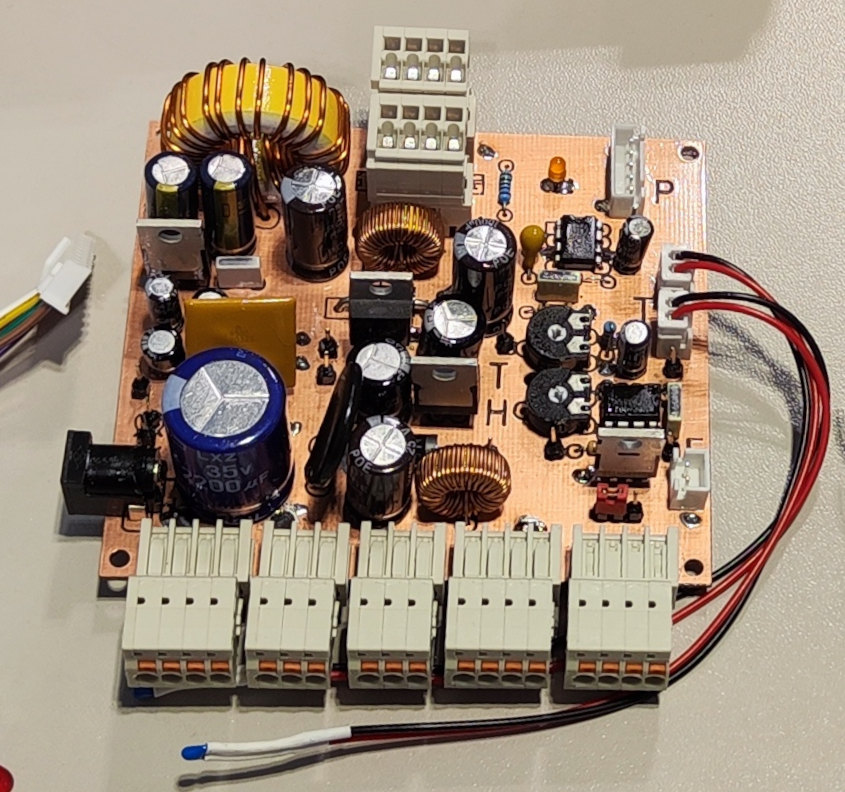 ### Features
**Input**:
- 24 V 5 A barrel plug.
- 5 A self-resetting polyfuse.
- Reverse polarity protection.
**Output**:
- 3.3 V, 3 A (buck converter).
- 5 V, 5 A (buck converter).
- -5 V, 20 mA (charge pump).
- 12 V, 3 A (buck converter).
- 24 V (supply voltage filtered).
**Fan Control**:
- 2x connector for 10 kΩ NTC.
- Threshold adjustable (trimmer potentiometer).
- Hysteresis adjustable (trimmer potentiometer).
- Select between 5 V or 12 V fan.
**General**:
- Spring-loaded terminals for each voltage.
- Combined internal terminals for all voltages.
### Schematic and Layout
---
## 3. **LED Boards**
Small PCBs with LEDs, resistors, and mounting holes for housing indicators.
### Photo
### Features
**Input**:
- 24 V 5 A barrel plug.
- 5 A self-resetting polyfuse.
- Reverse polarity protection.
**Output**:
- 3.3 V, 3 A (buck converter).
- 5 V, 5 A (buck converter).
- -5 V, 20 mA (charge pump).
- 12 V, 3 A (buck converter).
- 24 V (supply voltage filtered).
**Fan Control**:
- 2x connector for 10 kΩ NTC.
- Threshold adjustable (trimmer potentiometer).
- Hysteresis adjustable (trimmer potentiometer).
- Select between 5 V or 12 V fan.
**General**:
- Spring-loaded terminals for each voltage.
- Combined internal terminals for all voltages.
### Schematic and Layout
---
## 3. **LED Boards**
Small PCBs with LEDs, resistors, and mounting holes for housing indicators.
### Photo
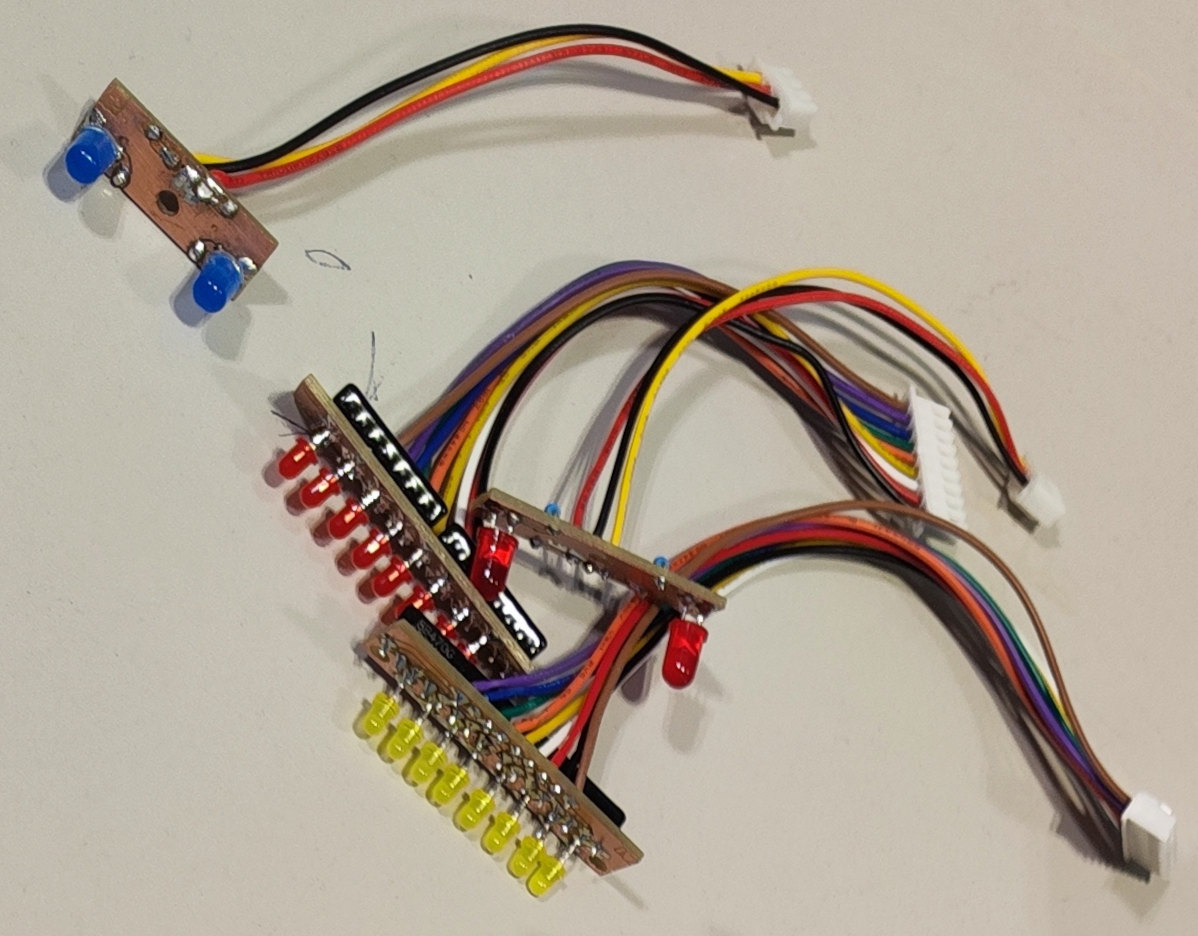 ### Boards
1. 2x 5 mm LEDs for relays.
2. 2x 5 mm LEDs for PWM outputs.
3. 8x 3 mm yellow LEDs for analog inputs.
4. 8x 3 mm orange LEDs for digital inputs.
5. 8x 3 mm red LEDs for digital outputs.
### Schematic and Layout
---
# Software/Firmware
Python code for operating the extension PCBs (e.g., GPIO pins, shift registers, ADC, and bus communication). This section is a work in progress (WIP), and example scripts will be added as development continues.
---
# Housing
Custom-designed enclosure includes:
- Ports for Raspberry Pi.
- Banana sockets for power outputs.
- Exposed screw terminals.
- Openings for buttons and LEDs.
- Mounts for all PCBs and wiring.
### Boards
1. 2x 5 mm LEDs for relays.
2. 2x 5 mm LEDs for PWM outputs.
3. 8x 3 mm yellow LEDs for analog inputs.
4. 8x 3 mm orange LEDs for digital inputs.
5. 8x 3 mm red LEDs for digital outputs.
### Schematic and Layout
---
# Software/Firmware
Python code for operating the extension PCBs (e.g., GPIO pins, shift registers, ADC, and bus communication). This section is a work in progress (WIP), and example scripts will be added as development continues.
---
# Housing
Custom-designed enclosure includes:
- Ports for Raspberry Pi.
- Banana sockets for power outputs.
- Exposed screw terminals.
- Openings for buttons and LEDs.
- Mounts for all PCBs and wiring.
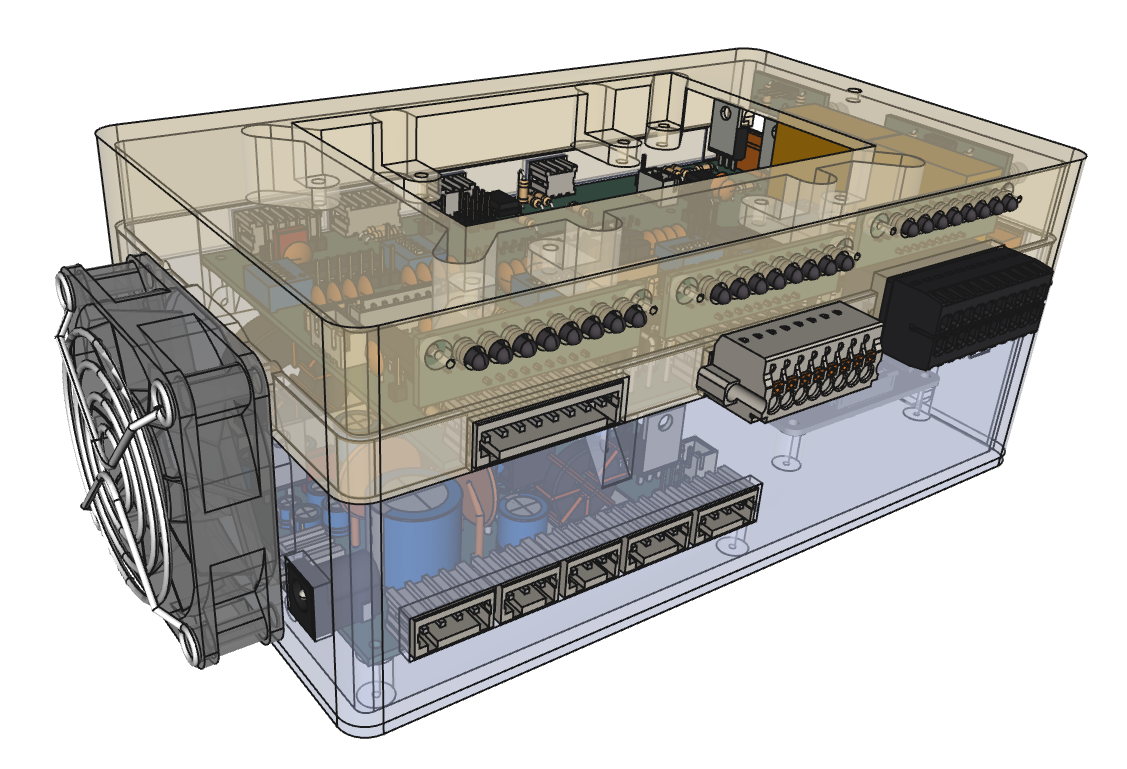 ---
# Dropped Features
The following ideas were considered but not implemented:
- UI Input Elements:
- Buttons, DIP switches, temperature sensors, encoders, or potentiometers.
- USB or battery-powered operation:
- Battery packs with BMS and voltage measurement.
- Li-ion cell holders.
- Analog output (DAC)
- More bus systems
- RS232 Interface
- CAN Interface
---
# Dropped Features
The following ideas were considered but not implemented:
- UI Input Elements:
- Buttons, DIP switches, temperature sensors, encoders, or potentiometers.
- USB or battery-powered operation:
- Battery packs with BMS and voltage measurement.
- Li-ion cell holders.
- Analog output (DAC)
- More bus systems
- RS232 Interface
- CAN Interface